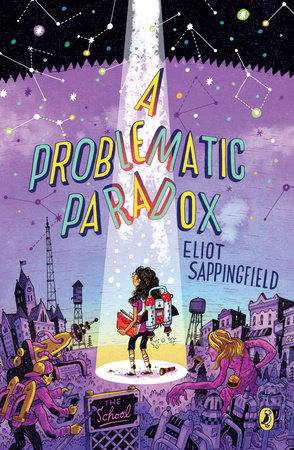Role Models in Science Fiction? My Daughters Asked Where They Were
by Eliot Sappingfield
“Girls always get magic — they never have science books about girls.”
It was a weeknight and one of my twin daughters, who was in middle school at the time, had marched into the room, brandishing a book she’d finished. “Why are books with science in them always about boys?” she wanted to know.
I told her that simply wasn’t true; there were loads of great science fiction books with girls in them. She agreed, but argued that in those stories the people who were actually doing science were usually boys, and the girls were just along for the ride.
My other daughter, who was heckling from the sofa, took her sister’s side and challenged me to come up with an example. They always do that.
This left me in a difficult position. I had a choice to make: either I could get up, walk across the house, and rummage through our catastrophically disorganized library to refresh my memory and point out some wonderful example of female-led science fiction (A Wrinkle in Time and The Golden Compass come to mind now that I’m not on the spot), or I could just admit they were right and remain in my extremely comfortable chair.
I’ve been asked a few times how I came up with the idea for A Problematic Paradox and my answer is always the same: it came to me in a moment of inspiration. I like that answer because it’s simple and makes me seem very creative. The fact that this explanation is not true does bother me from time to time.
So here’s the real truth: the story wasn’t my idea. Losing that argument didn’t get me off the hook at all. Instead, my daughters suggested I put away the (insufferable) thing I was working on and write something for them that had a girl doing science. Looking back, it’s the best argument I ever lost.
The more I thought about it, the more I loved the idea. My daughters were at an age when many young women turn away from STEM (science, technology, engineering, and math), perceiving those areas of study as unfriendly or out-of-the-norm for girls (a perception many educators and institutions fail to dispel). I’d also been reading about how important representation can be to young people. It’s one thing to tell a person they can do something, but seeing someone like them doing that thing can be orders of magnitude more powerful.
I challenged myself to keep a few rough guidelines in mind: First of all, the story had to be fun for anyone. I didn’t want to write a girl’s story. Writing a story for girls involves making a lot of assumptions about what girls are and are not supposed to like and giving the reader just that, which is part of the problem in the first place if you ask me. It’s every bit as important that boys understand that science is for everyone too. Besides, have you ever heard someone ask a girl why they’re reading a boy’s book because the story has a male lead? No? Then why are so many books with female leads automatically assumed to be girls’ books?
My second goal: the characters in the story could not have it easy. There would be no getting by on looks, innate talent, or status. In Paradox, for instance, even though our hero Nikola is a “certified genius” (in her own humble words), she’s constantly surrounded by people who are every bit as bright and capable as she is. There would also be absolutely no dependence on anything like romance as an ultimate “solves-everything” goal. Instead, the story would reward characters who display dedication, creativity, honesty, bravery, and compassion.
And finally, because stories work best when we can imagine ourselves in another world, I wanted the main character to be imperfect. She should be someone with flaws, shortcomings, and blind spots, as we all have. Nikola has moments of serious social awkwardness; she can be standoffish with peers, she’s a bit lazy, and she doesn’t do so well with authority figures. I feel like this not only makes a story more interesting to read, but it also helps make it clear that the most extraordinary things can be (and almost always are) done by ordinary people.
I’d like to add that A Problematic Paradox also contains several dozen extremely dangerous robot monkeys. These don’t serve any deeper purpose, but unlike the rest, they were entirely my idea.

